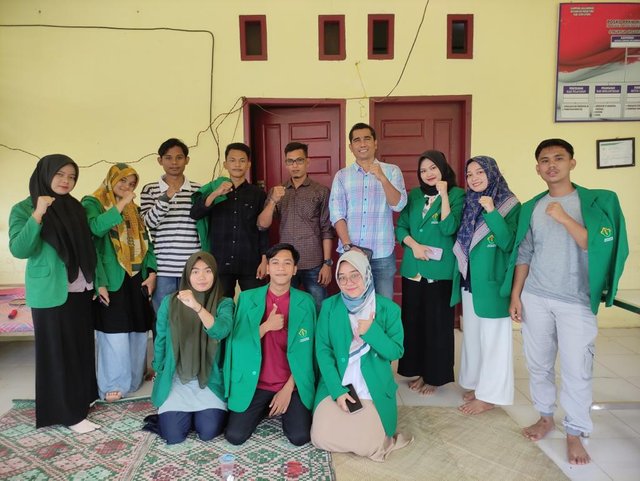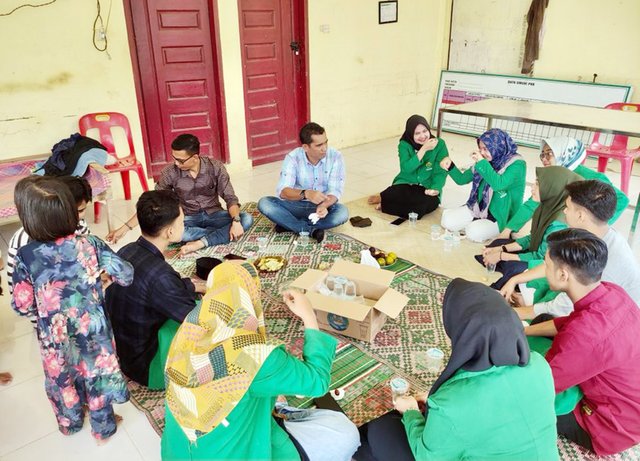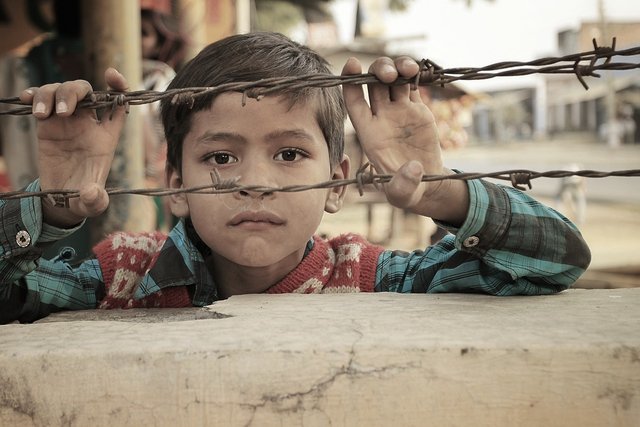"Zakat" Recipient Groups (Asnaf) From the Poor to Students |

Mahasiswa termasuk kelompok yang bisa menerima zakat.
Asnaf of zakat has been clearly stated in the Qur'an, there are eight groups who are entitled to receive zakat. However, to focus more on the problem being studied, the researcher only discusses asnaf that is directly related to improving the welfare of society, namely asnaf of the poor.
This poor group—although consisting of two groups—can be included in the category of people who are not well-off. Basically, the poor and the needy are different, one of them has less income than the other. But which one has less income, the jurists have different opinions on this matter. Some argue that the poor are more concerned, some argue that the poor are more concerned.
The consensus of scholars states that the poor and needy groups should be prioritized over other groups that receive zakat. This can also be found in the practice of today's society which prioritizes this group only. There are even some institutions that only distribute to this senif.
The practice in society so far that is considered poor is the community living in a village that has been calculated that their daily income is still less than their needs. When zakat has been collected, the zakat committee distributes it to them according to the existing portion.
Contemporary scholars have tried to analyze the comprehensive understanding of the poor. From the results of this analysis, this asnaf is also included, for example students, who have reached puberty but do not have certain wealth owned by them. If left alone, they will drop out of school and they will be able to become a stupid generation, so they are entitled to a scholarship every month until they finish their studies.
The same thing also applies to workers who do not have the capital to develop their business, for example doctors or pharmacists. They have a certificate to practice after completing their studies, but do not have capital so they cannot practice, therefore they are entitled to receive zakat for their business capital.
According to Said Hawa, if fukara wal masakin are people who are unable to work according to the Syafi'i school of thought, the government must buy them a garden and live off the results of the garden for life. If their living expenses are not enough with the value of the garden given, then they are entitled to receive benefits from zakat funds until they are able to carry out their daily lives.
Likewise, with the condition of people who are unemployed, because they have lost their jobs, the state must provide jobs for those who do not have working capital.
Islam highly values knowledge, therefore Muslims are required to master it. Not only religious knowledge, but also other knowledge needed by humans such as economics, health, technology, and others.
If someone specializes in seeking useful knowledge, and it is impossible to do it while working, then he is entitled to be given zakat as much as his study needs, including to buy books/books and others for the benefit of religion and the state.
The scholars do not differ in opinion regarding making it obligatory to seek knowledge the same as carrying out fardu kifayah. Because the benefits of his knowledge are not only limited to himself, but for all humans. For that reason he is entitled to receive assistance from zakat assets, because zakat is intended for Muslims who need help and for people who are needed by Muslims.
In this case, seekers of knowledge are included in these two categories. Some jurists require that intelligent people be included in the group of zakat recipients, and the same is treated in developed countries today. Likewise, because books are a basic need for Muslims, then for the poor it is permissible to receive zakat to buy books, either for religious or other public interests.[]


Golongan Penerima Zakat (Asnaf) Dari Fakir Sampai Mahasiswa
Asnaf zakat telah ditetapkan dalam Al-Quran secara jelas, terdapat delapan golongan yang berhak menerima zakat. Namun untuk lebih fokus kepada permasalahan yang diteliti, peneliti hanya membahas asnaf yang berhubungan langsung dengan peningkatan kesejahteraan masyarakat yaitu asnaf fakir miskin.
Golongan fakir miskin ini—kendati terdiri dari dua golongan—dapat dimasukkan dalam kategori orang-orang yang tidak berkecukupan. Pada dasarnya fakir dan miskin adalah berbeda, salah satu di antaranya lebih kurang pendapatannya dari yang lain. Tetapi mana yang lebih kurang pendapatannya para fukaha berbeda pendapat dalam hal ini. Ada berpendapat, fakir yang lebih memprihatinkan ada yang berpendapat miskin yang lebih memprihatinkan.
Konsesus ulama menyatakan golongan fakir dan miskin harus lebih diutamakan dari golongan-golongan lain yang menerima zakat. Begitu juga dapat dijumpai dalam praktik masyarakat sekarang yang lebih mengutamakan golongan ini saja. Bahkan ada beberapa lembaga yang hanya membagikan kepada senif ini saja.
Praktik dalam masyarakat selama ini yang dianggap fakir miskin adalah masyarakat yang tinggal di suatu desa yang telah diperhitungkan bahwa pendapatan hari-harinya masih kurang dari kebutuhan. Ketika zakat telah terkumpul, panitia zakat membagi-bagikan kepada mereka menurut bagian yang ada.
Para ulama kontemporer telah berusaha menganalisis pengertian secara komprehensif mengenai fakir miskin. Dari hasil analisis tersebut, maka dalam asnaf ini dimasukkan juga, misalnya pelajar, yang telah balig tetapi tidak memiliki kekayaan tertentu yang dimiliki oleh mereka. Jika dibiarkan mereka akan putus sekolah dan mereka akan dapat mengakibatkan menjadi generasi bodoh, maka mereka berhak mendapat beasiswa setiap bulan sampai selesai studinya.
Hal sama juga berlaku bagi pekerja yang tidak memiliki modal untuk mengembangkan usahanya, misalnya dokter atau apoteker. Mereka telah memiliki sertifikat untuk berpraktik setelah menamatkan studi, tetapi tidak memiliki modal sehingga mereka tidak dapat berpraktik, karena itu mereka berhak mendapatkan zakat untuk modal usahanya.
Menurut Said Hawa, jika fukara wal masakin adalah orang tidak mampu bekerja menurut mazhab Syafi’i, mereka pemerintah harus membelikan kebun kepada mereka dan hidup dari hasil kebun selama hidup. Apabila biaya hidupnya tidak cukup dengan senilai kebun pemberian tersebut, maka mereka berhak mendapat tunjangan dari dana zakat sampai mampu menjalankan kehidupan sehari-hari.
Demikian juga dengan kondisi masyarakat yang menganggur, karena kehilangan pekerjaannya, maka negara harus menyediakan lapangan pekerjaan bagi mereka yang tidak mempunyai modal kerja.
Islam sangat menghargai ilmu pengetahuan, karena itu umat Islam dituntut untuk menguasainya. Bukan hanya ilmu agama saja, tetapi juga ilmu-ilmu lain yang dibutuhkan oleh manusia seperti ilmu ekonomi, kesehatan, teknologi, dan lain-lain.
Jika seseorang mengkhususkan diri untuk mencari ilmu yang bermanfaat, dan tidak mungkin dilaksanakan sambil bekerja, maka ia berhak diberi zakat sebanyak keperluan studinya, termasuk untuk membeli kitab/buku dan lain lain untuk kemaslahatan agama dan negara.
Para ulama tidak berbeda pendapat mengenai mewajibkan menuntut ilmu sama dengan melaksanakan fardu kifayah. Karena manfaat ilmunya tidak hanya terbatas kepada dirinya, tetapi untuk semua manusia. Untuk itulah ia berhak mendapat bantuan dari harta zakat, sebab zakat diperuntukkan bagi orang Islam yang memerlukan bantuan dan bagi orang yang diperlukan oleh umat Islam.
Dalam hal ini, penuntut ilmu termasuk ke dalam dua kategori tersebut. Sebagian ahli fikih mensyaratkan orang yang pintar masuk dalam golongan penerima zakat, dan sama seperti diperlakukan di negara-negara maju sekarang ini. Demikian juga karena kitab/buku merupakan kebutuhan dasar bagi kaum muslimin, maka bagi orang fakir diperbolehkan menerima zakat untuk membeli kitab, baik untuk kepentingan agama atau kepentingan umum lainnya.[]


Panjang banget pembahasannya bang. Intinya apapun yang akan kita lakukan, musti didasari oleh ilmu. Kurang lebihnya gitu😬
Biar selesai satu-satu bahasan, makanya agak panjang lebar.